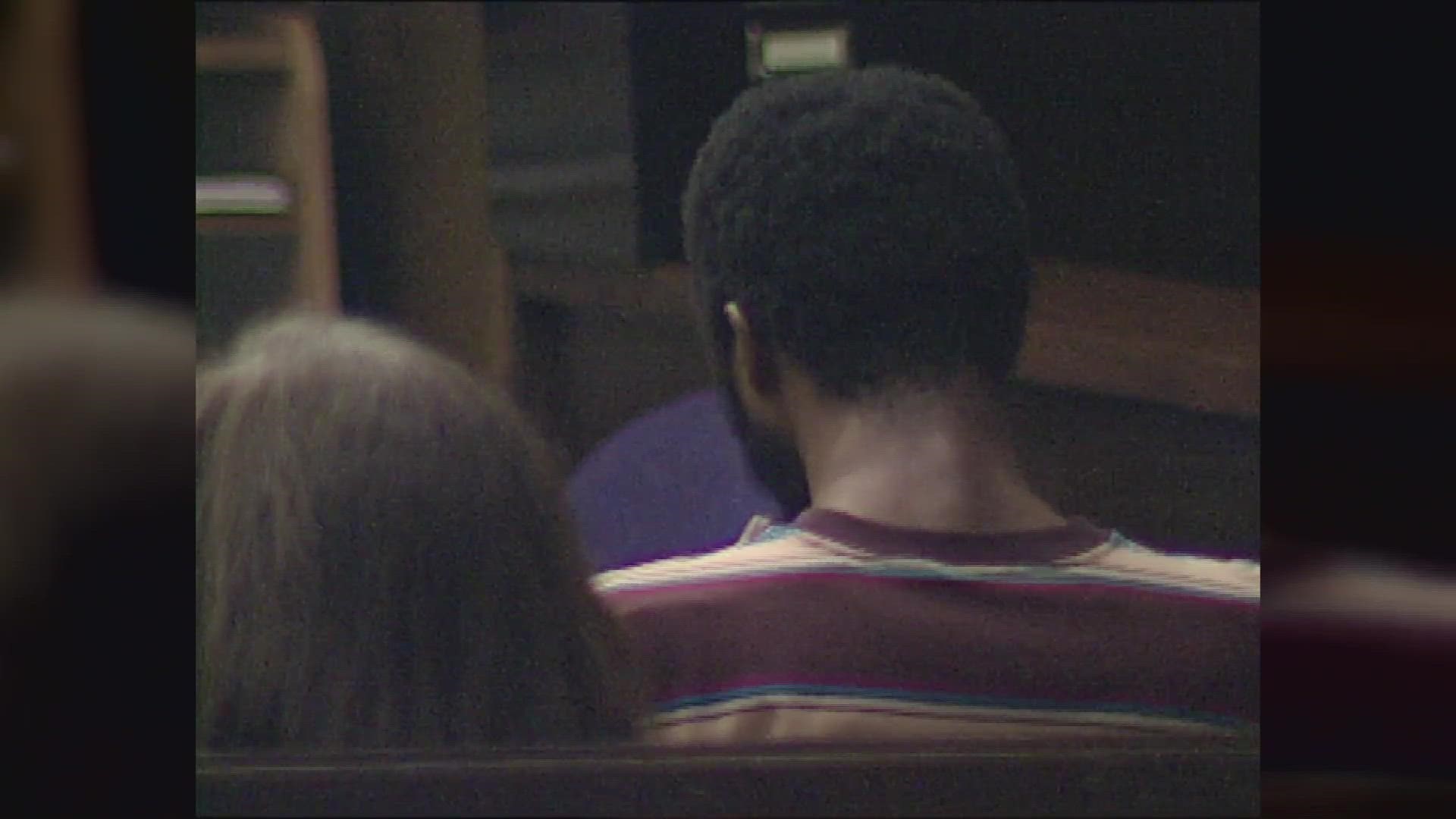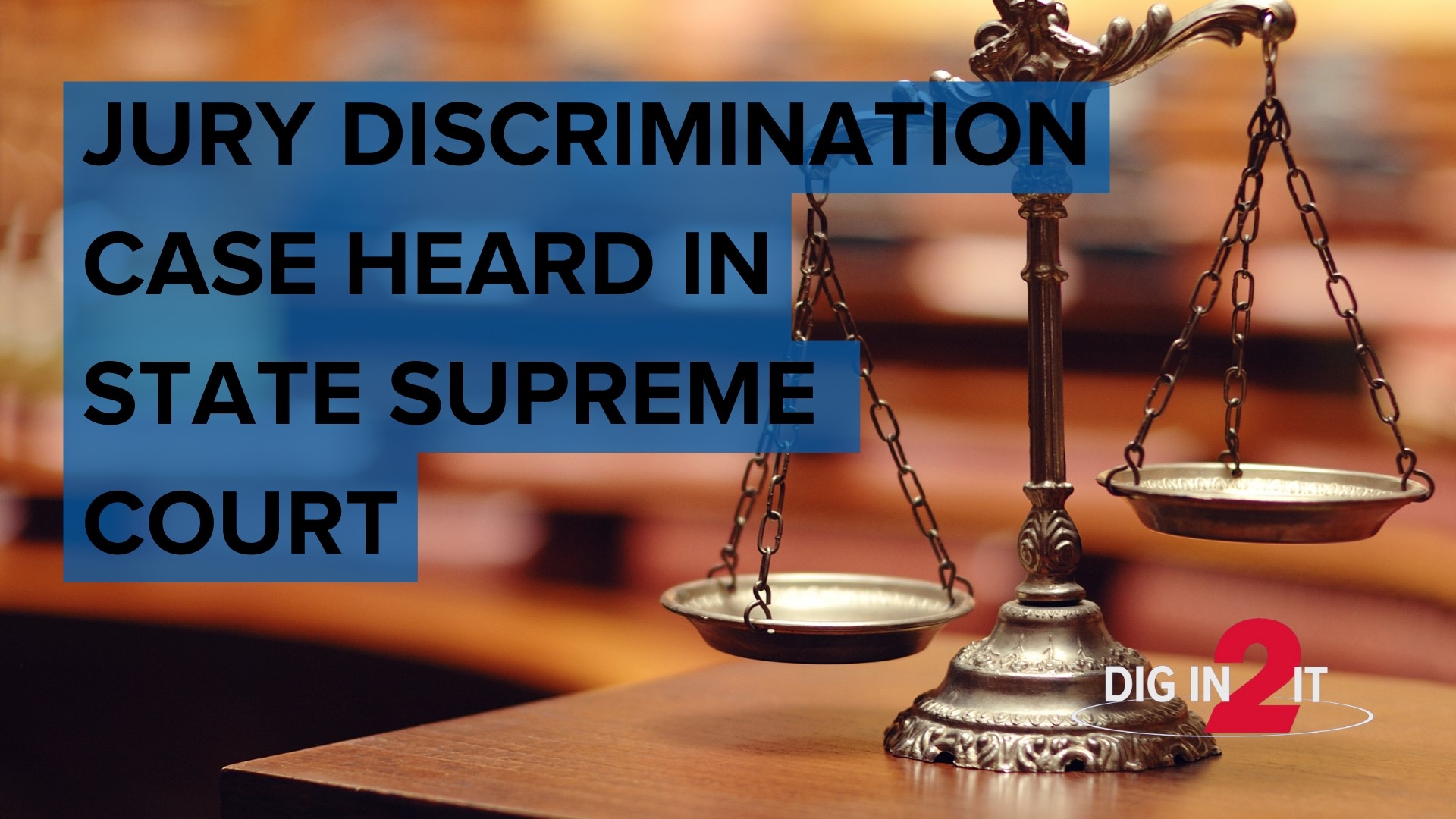Forsyth County man on death row has case heard in NC Supreme Court
Russell William Tucker's 1996 conviction could have bigger implications for how the state handles jury discrimination in the future.

In the North Carolina supreme court Wednesday, they're tackling a huge question: "Is our justice system really just for all people?"
At issue, a cheat sheet some civil rights activists say prosecutors used to strike black people from jury pools of black defendants.
Defendants like Russell William Tucker from Forsyth County.
His case is one of four related cases that were argued in front of the state's highest court.
Tucker, a Black man, was convicted of murder by an all-white jury in 1996.
Five Black potential jurors were all dismissed and Tucker's defense argues that the prosecutor's strikes to remove those jurors were on the basis of race.
Let's connect the dots...
Explaining Legal Precedent What is Batson v Kentucky
All four cases are being heard by the state now in response to the United State Supreme Court decision called Batson versus Kentucky.
A duke law professor says that the decision lowered the bar for proving discrimination in the jury selection process.
"24 what the Supreme Court announced, in that case, was that the previous standard that it had applied. Determining whether or not there had been juror discrimination was demanding, a crippling burden of proof, and it was essentially impossible to meet under the old Swain standard. And so they announced what they intended to be a standard of proof that would be possible to meet in alleging juror discrimination," Emily Coward, Director of the Inclusive juries Project at Duke School of Law.
To do that, the Supreme Court announced a three-part test that has to be completed when discrimination is alleged.
The first part of the test requires whoever is alleging juror discrimination to present some evidence that there could be discrimination in the selection.
"It doesn't have to be you know, proof beyond a reasonable doubt or a smoking gun, but something that allows the court. To determine that a hearing is necessary. So it's essentially a burden of production," Coward continued.
Then, for the second step, the side accused of discrimination has to defend why they removed a juror.
Their actual reason should be race-neutral.
Then for the third step, the court determines whether or not the juror strike was motivated by race, gender, or ethnicity, or if it was valid.
"While Batson was meant to be a standard that would allow for determinations of discrimination upon, you know, meritorious claims, it has proven very difficult. To meet. And one of the reasons is that almost any facially race-neutral reason has been accepted by courts to defeat a claim of juror discrimination," Coward added.
State v Russell Tucker What Tucker's representatives are arguing State v Russell Tucker
So how does this all apply to Russell Tucker from Forsyth County?
This is kind of complicated but it has huge implications for future cases here in the Triad.
The Center for Death Penalty Litigation which is representing Tucker says there were only five Black people in the potential jury pool.
All five were removed.
The center says when the prosecutor was questioned about the reason for the removal. He brought up vague reasons like body language or failure to make eye contact.
Those sound like they could be race-neutral reasons, but Tucker's lawyers say they came right off a worksheet given to North Carolina prosecutors during training. The Center for Death Penalty Litigation says they found a copy of that handout in prosecutor files a few years ago.
The North Carolina Supreme Court has previously called that worksheet a cheat sheet. It provides a list of reasons a prosecutor can give to strike a juror.
"The evidence presented that may be reviewed by the court if it reaches the merits suggests that this cheat sheet was used as a script to sort," Gretchen Engel, an Executive Director with the Center of Death Penalty Litigation said. "Potentially conceal the actual reason and, many of the reasons that are listed on the cheat sheet have historically been associated with derogatory stereotypes about African Americans. So even on its face, I believe there are great concerns about whether or not any of those reasons are actually facially raced neutral."
"I think the idea of having African Americans denied their right to serve on a jury, and Mr. Tucker having been denied his right to a jury of his peers, that's representative of his community there in Forsyth County, should be concerning to all of us," Engel continued.
What the state's defense argues Subtitle here
Lawyers for the State Department of Justice made several arguments in the Supreme Court Wednesday.
The main point asking why is this argument being brought up now:
"He's had opportunities in abundance to raise this claim and has failed to do so," Danielle Elder, a Senior Deputy Attorney with the NC Dept. of Justice said.
Tucker's lawyers say they just found the document, but prosecutors aren't buying it.
"We have argued that it was available because it was part of the prosecutor's files that were given in 1999," Elder added.
Even if the document was newly released to the defense, the state claims it is not evidence of discrimination.
"The CLE handout in and of itself does not evidence racial discrimination," Elder said. "It is the use of the defendant contends evidences racial discrimination, but the mere document itself does not and for the reasons that the MAR court noted below, there's nothing that indicates anything or in fact from the transcript itself any indication that there was any sort of racial discrimination in the selection of this jury. What we're talking about here today is whether or not the defendant should be afforded the opportunity to raise now what is procedurally barred and has been for quite some time based upon what he presented to the MAR court."
North Carolina Death Penalty History Why does Tucker's case matter?
So why does this case matter?
It's one example of a systematic problem according to a Michigan State University study.
Researchers looked into the jury selection of North Carolina trials that ended in a death sentence.
The study says:
Prosecutors exercised peremptory challenges at a significantly higher rate against black jury pool members than against all other jury pool members.
The study found 52% of all eligible black potential jurors were excused compared to 25% of potential jurors of all other races. It says there is less than a one in one thousand chance that there would be the same disparity if the jury selection process was actually race-neutral.
Emily Coward with Duke Law's Inclusive Juries project says that's a disservice to our justice system.
"Not only do we have constitutional rights to a jury of our peers and to a jury that under the Sixth Amendment, fair Cross section doctrine and also to a jury that's selected without discrimination, under equal protection guarantees and under state and federal. All of the available research demonstrates that diverse juries perform better," Coward explained.
She went on to say it is important that you have a jury that reflects a variety of viewpoints and a variety of identity categories so the jury will likely consider all evidence.
What happens now?
While arguments were heard in the Supreme Court, the court won't make a decision right away.
It's expected to come sometime this year, months from now.
WFMY News 2 will continue to follow this case and update you with the court's ruling.


